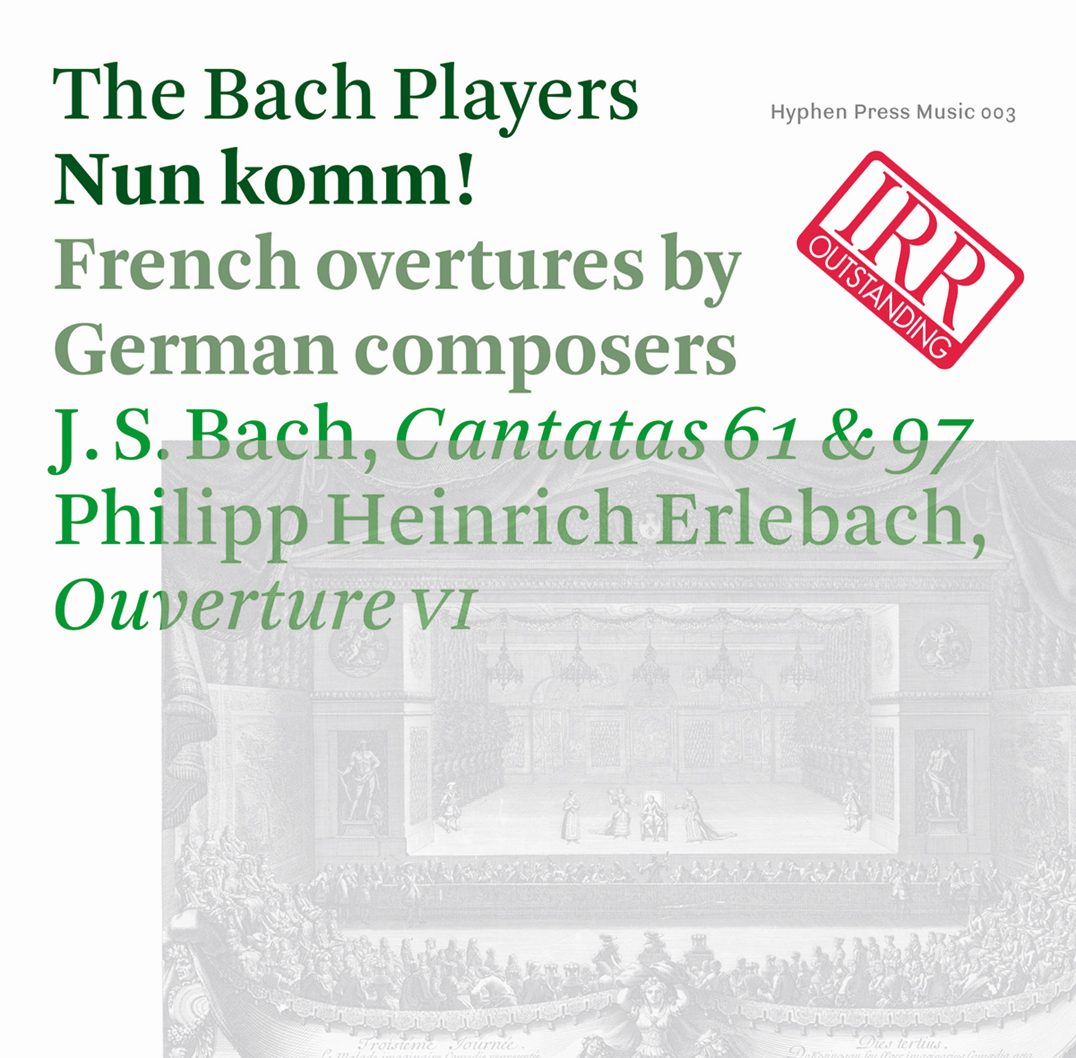Back to Recordings
Nun komm!

The Bach Players explore the form of the French overture in two cantatas by J.S. Bach: the thrilling Advent cantata ‘Nun komm der Heiden Heiland’ (BWV 61), from his Weimar years, and ‘In allen meinen Taten’ (BWV 97) from his later years in Leipzig. They play a dance suite by Philipp Heinrich Erlebach, opening with another French overture. To complete the disc, Heinrich Isaac’s beautiful ‘Innsbruck ich muß dich lassen’, which provides the choral melody for cantata 97, is sung a capella, and is played in two instrumental settings.
The music
J.S. Bach (1685–1750): Cantata ‘Nun komm der heiden Heiland’, BWV 61
Philipp Heinrich Erlebach (1657–1714): Ouverture VI
‘Innsbruck ich muß dich lassen’, set by Christian Hollander (c. 1510 – 1589)
Heinrich Isaac (c. 1450 – 1517): ‘Innsbruck ich muß dich lassen’
J.S. Bach, Cantata ‘In allen meinen Taten’, BWV 97
‘Innsbruck ich muß dich lassen’, set by Paul Luetkeman (c. 1560 – c. 1611)
The musicians
The Bach Players:
Rachel Elliott soprano
Sally Bruce-Payne alto
Nicholas Mulroy tenor
Peter Harvey bass [BWV 97]
Jonathan Gunthorpe bass [BWV 61]
James Eastaway oboe
Catherine Latham oboe
Alastair Mitchell bassoon [BWV 97]
Philip Turbett bassoon [BWV 61]
Nicolette Moonen violin & director
Sophie Barber violin
Rachel Isserlis viola
Rachel Stott viola
Alison McGillivray cello
Elizabeth Bradley double bass
Silas Standage harpsichord / organ
William Carter guitar
Recording & production
Producer: Roy Mowatt
Recording engineer: Alan Mosley
Recorded at St Michael’s Church, Highgate, London, 30 November to 2 December 2009
Presentation
A 16-page accompanying booklet includes an essay on the music by the composer Hugh Wood, texts of the words sung and with English translations. Illustrations in the booklet and CD packet show music and theatre at Versailles under Louis XIV, by Jean le Pautre and François Chauveau, supplemented by photographs of the musicians in concert and rehearsal.
Reviews
You need not check out their website (which includes an endearing collage of photographs of the musicians with Bach himself embedded near the middle, the only colour portrait in a sea of black and white) to know that The Bach Players ‘is a collective of like-minded musicians who are drawn together by their passion for the music of J.S. Bach’. That oozes out of every moment of this quite magical disc. Intimate, infused with joy and overflowing with genuine affection, this is music-making which combines enthusiasm and craftsmanship to create something both rare and precious. With just a single voice to each part the choruses may sound a little thin, but in all other respects these are performances which stand out from the crowd for their freshness, vitality and sense of total commitment to the music.
The five voices which carry the entire vocal weight of the two Bach cantatas are unfailing in their purity and precision. In the order in which they appear on the disc, Nicholas Mulroy proves an agile and delightfully athletic tenor in his aria ‘Komm, Jesu, komm’, Jonathan Gunthorpe, while making a mere 47-second solo appearance in a recitative from BWV 61, paves the way beautifully for the delectably pure-toned Rachel Elliott, while Sally Bruce-Payne brings a touch of drama and something approaching majesty to her BWV97 recitative and aria. Peter Harvey delivers his aria ‘Nichts ist spat und frühe’ with a charming buoyancy which seems to float above the graceful support of Alison McGillivray and Silas Standage. A real highlight, and the one track potential buyers should listen to if they need convincing that this is a disc to snatch up at the earliest opportunity, is the beautifully bubbly duet between Harvey and Elliott from BWV97, ‘Hat er es denn beschlossen’.
Complementing such excellent singers, the dozen instrumentalists inform the entire project with a pleasing lightness of touch, infusing it all with the spirit of the dance which finds its apogee in the Erlebach Ouverture, a wonderful suite of dances which is almost more French than the French themselves (hence the otherwise perplexing question posed in the booklet notes, ‘How come that Bach and Erlebach were both German composers?’). In fact, the link between these seemingly unconnected works is the French ‘ouverture’, each of the cantatas following the outline of the French model. It makes for the kind of intriguing programming approach which is clearly one of the hallmarks of The Bach Players, their two previous discs exploring the use of the chaconne and the possibilities opened up by composers rearranging each others’ work. Another hallmark, and one which lies close to the heart of all readers of IRR, is the superlative quality of these recordings, which are models of clarity and balance.
Dotted around the disc like so many rustic seats in an ornamental garden are versions of the ancient song hymn ‘Innsbruck, ich muss dich lassen’, which is the chorale melody running through BWV97. We hear it in two instrumental versions, by Christian Hollander and Paul Luetkeman, as well as in an unaccompanied four-part setting by Heinrich Isaac. It all adds another fascinating strand to this programme and serves to demonstrate further the extraordinary musical qualities of The Bach Players.
Encased within a most attractive and stylish package – although tenor Nicholas Mulroy is labelled an alto on the outer cover – complete with rare engravings and a substantial booklet note, this is a highly treasurable recording which cannot fail to enchant those who come across it. It has certainly worked its magic on me.
Marc Rochester, International Record Review, November 2010